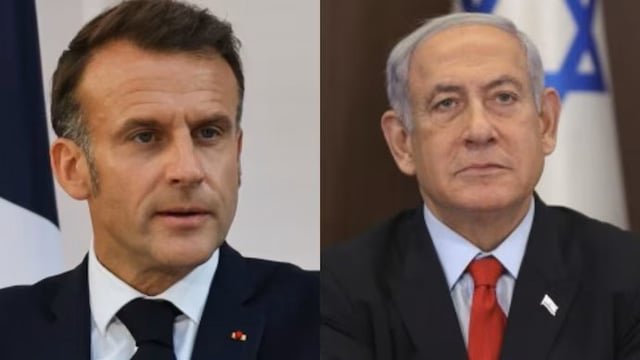Israel–France diplomatic row escalates as Netanyahu accuses Macron of ‘fomenting antisemitism’
Published: 20 August 2025, 3:29:20

Tensions between Israel and France reached a diplomatic crisis on Tuesday after Israeli Prime Minister Benjamin Netanyahu accused French President Emmanuel Macron of encouraging antisemitism by announcing plans to formally recognise a Palestinian state next month.
In a strongly worded letter seen by AFP, Netanyahu charged that Macron’s recognition plan had caused a “surge” in antisemitism in France, writing:
“Your call for a Palestinian state pours fuel on this antisemitic fire. It is not diplomacy, it is appeasement. It rewards Hamas terror, hardens Hamas’s refusal to free the hostages, emboldens those who menace French Jews and encourages the Jew-hatred now stalking your streets.”
The Elysée Palace swiftly rejected Netanyahu’s accusations, calling them “abject” and “erroneous,” and warning that this is a time “for seriousness and responsibility, not for conflation and manipulation.”
The French presidency reiterated that France “protects and will always protect its Jewish citizens” and said President Macron has consistently acted against antisemitism, especially following the Hamas-led October 7 attacks in Israel last year. The Elysée added that Netanyahu’s allegations “will not go unanswered.”
France, home to Europe’s largest Jewish population, recorded a sharp rise in antisemitic acts last year, with reported incidents jumping from 436 in 2022 to 1,676 in 2023, according to interior ministry figures.
Background: France’s recognition of Palestine
Macron announced last month that France would formally recognise a Palestinian state during a UN meeting in September, aligning itself with a growing number of countries following the ongoing war in Gaza, now nearing its second year. France has long supported a two-state solution and insists its recognition plan opposes Hamas, not Israel.
If implemented, France would join at least 145 of the 193 UN member states that already recognise Palestinian statehood or have announced plans to do so.
Regional and international reactions
In response to Netanyahu’s letter, the Palestinian Authority’s foreign ministry condemned the Israeli leader’s remarks, calling them “unjustified and hostile to peace”.
“The old record of confusing criticism of the Israeli occupation… with antisemitism… is cracked and exposed, and no one is fooled,” the ministry said.
French Minister for Europe Benjamin Haddad also pushed back, saying France has “no lessons to learn in the fight against antisemitism” and warned against exploiting the issue, which he described as poisoning European societies.
Netanyahu also lashes out at Australia
Netanyahu also targeted Australia on Tuesday, after Prime Minister Anthony Albanese announced similar plans to recognise Palestinian statehood next month.
In a post from his official office’s X account, Netanyahu called Albanese a “weak politician who betrayed Israel and abandoned Australia’s Jews.”
The spat followed Australia’s decision to cancel the visa of far-right Israeli politician Simcha Rothman. In retaliation, Israel’s Foreign Minister Gideon Saar announced the revocation of visas for Australia’s representatives to the Palestinian Authority.
What’s next?
The diplomatic fallout underscores the increasingly polarised global debate over Palestinian statehood amid the continuing war in Gaza. With key European and Pacific nations moving toward recognition, and Israel pushing back forcefully, September’s UN meeting is shaping up to be a major flashpoint in international diplomacy.





